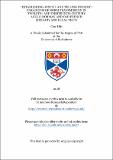Files in this item
"Establishing justice and telling stories" : paradigms of norm transmission in twelfth- and thirteenth-century Anglo-Norman and Old French literary and legal texts
Item metadata
| dc.contributor.advisor | Hudson, John | |
| dc.contributor.author | Hitt, Cory | |
| dc.coverage.spatial | xii, 180 p. | en_US |
| dc.date.accessioned | 2018-07-23T08:29:08Z | |
| dc.date.available | 2018-07-23T08:29:08Z | |
| dc.date.issued | 2018 | |
| dc.identifier.uri | https://hdl.handle.net/10023/15627 | |
| dc.description.abstract | The texts that comprise the corpus of Old French and Anglo-Norman literature of the twelfth and thirteenth centuries feature numerous portrayals of courtly life. The rules of that life, as they are presented in the literature, are contradictory, fluid, and open to interpretation. The tangle of courtly etiquette in Old French and Anglo-Norman literature, however, possesses certain recognizable recurring elements. These elements form something approaching a corpus of normative behaviours, expectations, and roles. We might even say, as Gadi Algazi and Stephen D. White have suggested, that medieval literature contains templates of various social and legal strategies of which the reader could have availed himself. This thesis seeks to study these norms and templates and how they are communicated. A detailed study of the ways they are transmitted within each text, coupled with an examination of their content, reveals much about authorial voice and stylistic technique. This dual study of form and content also illuminates the author’s understanding of honour, gender, the law, and justice. The literature also offers a glimpse into the psychology and strategy of the medieval legal process. This thesis seeks to build on this thematic connection between legal and literary texts. I therefore compare paradigms of norm transmission not only between individual literary texts, but also with paradigms in law books; specifically, the twelfth- and thirteenth-century coutumiers of Northern France, Glanvill, and Bracton’s De Legibus. The law books are analysed from a stylistic, literary angle, and the ideals of the “law book author” are proposed. Broadly, this thesis considers the process of storytelling, seeking to explain how legal texts tell the story of the law alongside contemporary literary conteurs. | en_US |
| dc.language.iso | en | en_US |
| dc.publisher | University of St Andrews | |
| dc.subject.lcc | PQ155.L2H5 | |
| dc.subject.lcsh | French literature--To 1500--History and criticism | en |
| dc.subject.lcsh | Anglo-Norman literature--History and criticism | en |
| dc.subject.lcsh | Law and literature | en |
| dc.subject.lcsh | Law, Medieval | en |
| dc.title | "Establishing justice and telling stories" : paradigms of norm transmission in twelfth- and thirteenth-century Anglo-Norman and Old French literary and legal texts | en_US |
| dc.type | Thesis | en_US |
| dc.contributor.sponsor | Seventh Framework Programme (European Commission) | en_US |
| dc.type.qualificationlevel | Doctoral | en_US |
| dc.type.qualificationname | PhD Doctor of Philosophy | en_US |
| dc.publisher.institution | The University of St Andrews | en_US |
This item appears in the following Collection(s)
Items in the St Andrews Research Repository are protected by copyright, with all rights reserved, unless otherwise indicated.

